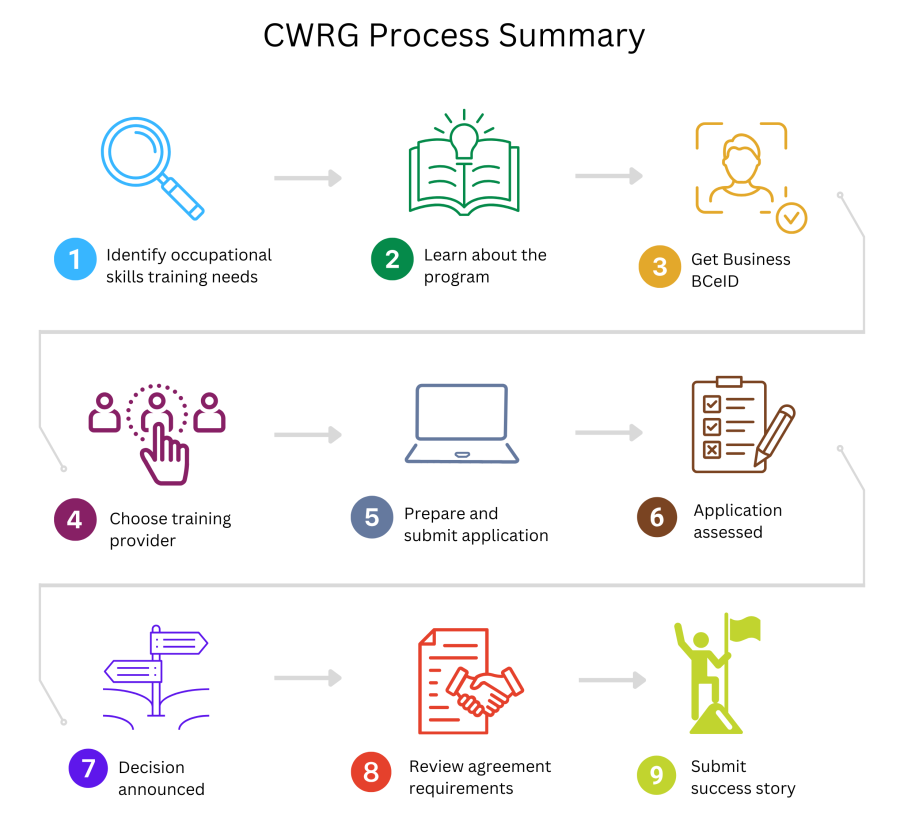Grant Overview
The Community Workforce Response Grant (CWRG) provides flexible and timely responses to urgent labor market needs faced by communities in B.C. Communities can access the program to address workforce challenges due to changing local economic conditions, emerging priorities or unexpected natural disasters. CWRG funds cohort-based skills training that helps people get the skills they need to find and keep a job, contributing to a strong local economy.
Communities, both Indigenous and non-Indigenous, as well as all sector associations regardless of size, are eligible to apply for funding to facilitate a short-term (under 52 weeks) skills training project.
Through funding skills training projects, the goal of the CWRG is to work with communities and organizations to move participants from precarious employment situations into more sustainable employment opportunities.
The program pays 100 percent of all tuition costs, provides financial support to participants and provides an administration fee to approved applicants.
CWRG is here to assist local governments, unions, non-profit organizations and sector associations who wish to increase their community’s economic resiliency and diversification through occupational skills training.
Funds for CWRG come from the Canada–British Columbia Workforce Development Agreement and the Stronger BC: Future Ready Action Plan.
CWRG Priorities
- Projects that serve:
- Indigenous communities
- Rural and remote communities, and/or
- Communities impacted by the recent loss of a major employer, natural disaster, or sudden, significant economic disruption
- Projects offering occupational skills training that address community-specific emerging priorities, economic diversification or innovation, or regional High Opportunity Occupations (HOO).
- Projects offering occupational skills training for the following sectors:
- Healthcare
- Social Services
- Education
- Trades (foundations or trade samplers)
- Projects where a Community Transition Table has been established through provincial Community Transition Services. Eligible communities may submit applications at any time from April 1, 2025 to February 1, 2026, subject to funding availability. Please contact CWRG@gov.bc.ca before applying.
Program Highlights
Who can apply?
- Local non-profit organizations, Indigenous and local governments, sector associations, unions, and major employers in a single resource community can apply for funding to support occupational skills training that is 52 weeks or less.
Who can provide the training?
- The applicant must engage a qualified third-party training provider.
What funding is provided?
- CWRG funds cohort-based training (three or more participants receiving the same training at the same time for the same duration) up to a project total of $300,000.
- CWRG covers 100 percent of all training costs that include:
- $11,000 per participant for skills training costs
- Participant financial support depending on the length of training
- Employment support services up to $400 per participant
- Administration fees up to 10 percent of the total project cost (12 percent for Indigenous applicants)
How do I apply?
- Apply online with your organization's BCeID business-level account.
When can I apply?
- CWRG accepts applications during set intake periods and provides funding decisions within a set window.
Who do I contact if I have questions?
- Please contact the CWRG program at CWRG@gov.bc.ca
For full program details and requirements, please refer to the CWRG Program Guide.
CWRG Process Summary

|
|






